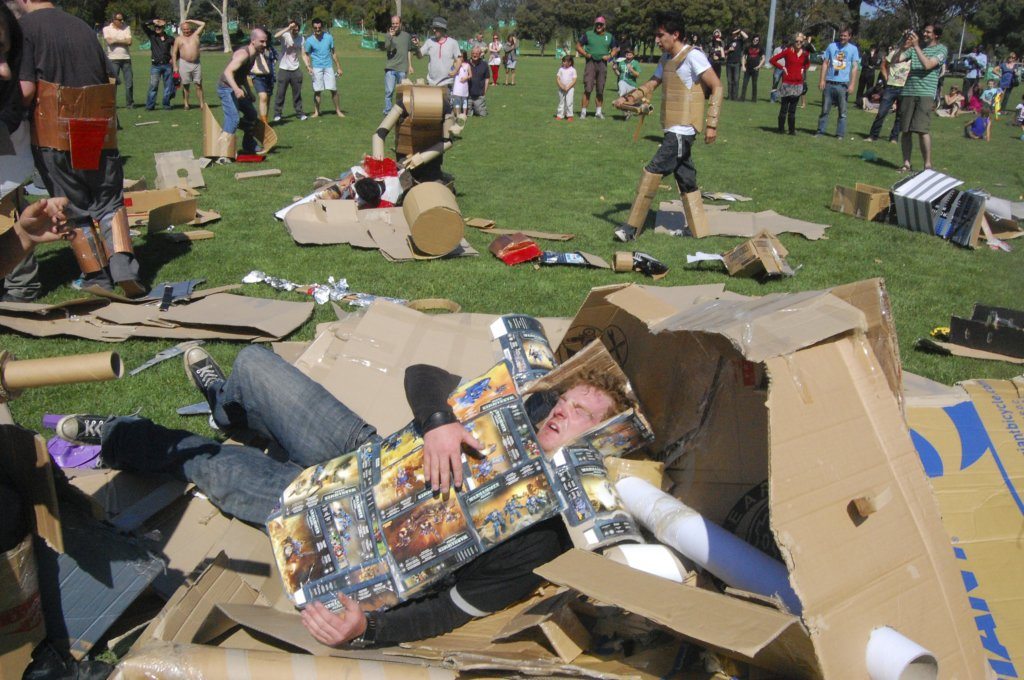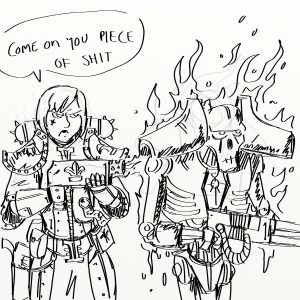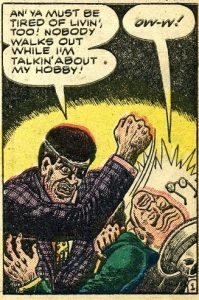A few easy tips for steering clear of the most common ways to ruin a game in short order.
Talk to your opponent.
This bit isn’t really part of a tournament game, but before you get started in a pickup game at your local store or club it really pays to talk things out with your prospective opponent. What kind of army are they playing? What kind of game do they want? What missions? Some players might want to practice for a tournament, while others might be looking to try out a wacky scenario they found- and if those two players have a match without discussing their expectations, they are both going to have a bad time. There’s no right or wrong way to play the game, but you do need to discuss what you’re looking to get out of it because the other guy may be looking for something else.
Be social.
When you walk up to the table, smile and say hello to your opponent; shake their hand, introduce yourself, and go through all that rigmarole that’s expected. The reason it’s expected is that politeness is the grease of social interaction- it keeps all the parts moving smoothly and easily. In any setting where you don’t know the player personally (i.e. most tournaments and pickup games) both of you are starting with blank slates, for better or for worse; starting things off on a positive note will go a long ways towards making a good impression on the other player and thus making for a good game.
Now, I realize not everyone in this hobby is an outgoing extrovert who thrives on attention and conversation, but that’s not really the point. I’m something of a misanthrope myself and one of my regular tournament traveling companions is a diagnosed autistic individual, but we both still manage to smile and be sufficiently perky for normal purposes- and in light of that, no one else really has a better excuse not to. You don’t have to be a smarmy gladhandler, you just have to be nice enough that people don’t actively resent your presence.
Go over terrain and armies
Different groups play terrain very differently- some make hills difficult terrain to get up the sides, or only on certain sides of them. Some play all ruins as having specific distances for each level and some measure it all inch-by-inch. Some count all ruins as having a “footprint” to match their linear dimensions, and some insist that only ruins with bases use those rules. Especially if you’re playing at a regular club or shop event, there may be certain “agreed” rules that all of the local players use for specific terrain pieces. No matter how you do it, I guarantee you that someone, somewhere else plays it differently and discovering this fact in the middle of a game can be a really great way to ruin the experience for both of you- so save yourself some trouble and go over things before the game starts. What cover save does everything count as? What is impassible, and what is difficult? Do any terrain pieces qualify as special types, like forests or ruins? What are the boundaries of different pieces? What can and can’t be moved through or over? Terrain makes the game leagues more fun, but only if you can interact with it- and you’ll want to ensure that both you and your opponent have the same assumptions about everything.
On a similar token, go over your respective armies before the game gets underway. This is pretty second nature for tournament players, but it’s just as important for casual players- no one wants a nasty surprise to crop up during the game and ruin things. The game is more complicated than it’s ever been- make sure the other guy knows what your different detachments do and what units they contain, which psychic powers and warlord trait you rolled, and all of the other little details about special rules your army possess and whatnot. Some people are familiar with “enemy” factions, others less so- it’s always good to check and make sure. If the other person doesn’t know your army, give them a quick (and honest) overview- where the big guns are, what the major tricks are, etc.
Be clear about what you’re doing and why.
One of the most frustrating things during a game can be the “mystery dice” phenomena where your opponent rolls a sequence of dice, calling out results (“Two hits, two wounds, three saved, roll six dice for me.”) without explaining what is going on. When you roll dice, it is good form to announce what’s going on (in basic terms) to your opponent- especially so when you are manipulating the results of the dice (i.e. through a reroll) or have modifiers to a normal roll (i.e. Stealth, Markerlights, or other bonuses.) If you just sort of reroll things whenever you want without saying anything about why, your opponent is going to feel like they are being cheated even if what you’re doing is 100% legit. I’ll often announce the whole sequence of an event, such as “My Crisis suits are shooting plasma at your vehicle- needing threes to hit you thanks to my Markerlight counter, so that’s five hits and then fours to glance with a reroll from Tank Hunter, so a total of three pens and one glance- take your cover saves.”
Be generous.
As we’ve already said, 40K is a game with a lot of rules. A lot of rules. We all forget things sometimes, be it moving a unit, resolving a combat, or maybe even an entire psychic phase. Letting your opponent take back something they did, change a decision, or retroactively take an action they missed goes a long way towards convincing them that you aren’t a hideous mockery of a human being. Of course this isn’t a privilege to be abused infinitely- if they keep forgetting things time after time, you have to draw the line somewhere, but it’s usually pretty reasonable to let them have a mulligan or two unless they have been exceptionally awful to you already. Remember that this goes both ways- if you let them go back to something, it can be expected that they will give you the same permission, so it needn’t even be an entirely altruistic act.
Take the time to notice the opponent’s army.
We play this game because we love our armies; we put hundreds (or thousands!) or hours into them building, converting, cleaning, painting, and optimizing them and we drive or fly large distances to gather with other folks and show off all our work. We like it when people notice what we’ve done and appreciate it, and this is wholly reciprocal- our opponents like it when we do the same for them. While you’re playing the game (or getting ready to play), take a moment to observe your opponent’s army. Does it have a really clean paint scheme? Did they do some interesting conversions? Do they have a really thematic presentation for their army list? Are they using an unusual unit or upgrade that isn’t often seen? Did they achieve a really unique effect with their basing or paint? Ask them about it- most players are more than happy to pontificate about their army for exactly the same reason we each love telling other people about our own army- it’s just human nature. And, all pandering aside, many players really will have something interesting to tell you or teach you about the hobby- you might find a really good idea for a conversion or paint scheme later on or a technique you hadn’t even considered if you take the time to ask.
Don’t get upset over bad dice.
40K is a game of dice; that means, by definition, it is a game of randomness. Human beings are incredibly bad at understanding how statistics and randomness actually work- we see a roll with four sixes out of ten dice and rave about how incredibly unlikely that is while completely forgetting that we have rolled dice thousands of times in a single game and it should come as no surprise at all that outliers will pop up occasionally- in fact, it would be strange if they didn’t. So when the dice go bad for you, just accept it; go through your little rituals and superstitions if you must, but realize that it’s only temporary and it could just as easily turn around at any moment and happen to your opponent as well or instead. No one will blame you for being frustrated at bad turns, but that doesn’t excuse the childish temper tantrums and complaining that are so common to the hobby.
Corollary: it is incredibly bad form to rejoice at your opponent’s bad dice. C’mon now, is this not obvious? As shitty as you feel when you can’t roll a three to save your HQ’s life, your opponent will feel just as shitty when it happens to them. Don’t rub it in- commiserate with them to the extent it feels appropriate and keep on with the game. If you pump the fist when your opponent fails an important roll due to awful luck, you’re kinda being a dickbag. (Of course, there are times when the sheer improbability of an event baffles, astounds, or even impresses both players- in these cases it is fine to share your opponent’s reaction, but if he’s unhappy about it then you probably shouldn’t be celebrating.)
If you’re not enjoying the game, end it.
Sometimes it happens that a game doesn’t go well- someone makes a mistake that tips the balance of things too far, or your luck is bad and you’re really not feeling it, or there have been some bad interactions between the two of you. Sometimes games just don’t go well; it happens. Don’t feel ashamed about admitting that you’re not enjoying the game and you’d like to call it- it doesn’t have to be an aspersion on you or on your opponent, but just a simple fact of how things sometimes are. Now, it also can happen that there are rough patches in games that you can get through with just a bit of determination, so it doesn’t really pay to just give up on things immediately as soon as anything goes wrong, but if you genuinely are not having any fun and don’t see any chance that you will down the road with the game, by all means stop it. This is a hobby, not a job- you don’t owe anyone anything other than basic respect when it comes to playing with toy soldiers.






Yup, yup and yup to all of this. All of the points mentioned are all coming down to mutual respect, and that goes as far as bodily hygiene as well. There is nothing more annoying to me than to shake an opponents hand before a game who had his entire box of pizza blow up on his shirt, and looks, especially smells “un-kept”.
Having moved to Chicago and played at a couple of different palced, I have to admit that it hasn’t happened yet. But, I lived most of my live in Ohio, and without dissing the state, the amount of “dirty” players was astounding.
Interestingly you mentioned “notice your opponents army”… I appreciate great custom model work and paintjobs, I have myself fully painted 6000pts of AM/IG, and while I usually give out tons of praise to other peoples work, it fills my heart with sadness when my opponent doesn’t even say a single word about the 185 painted guardsmen that look at him..waiting for a praise themselves haha.
For the most part though I’ve been having great experiences, last game I played I managed to roll miserably bad, 4 1’s on a 6 dice 2+ cover save was just one of the highlights of the night, both my opponent and I had a good laugh about it, but it never felt like I was taking advantage of. You for yourself should also not be too bitter, or upset if the dice roll against you.
Last thing that kind of grinds my gears is if the other player doesn’t pay attention to the game, or only his turn. Man, I understand that waiting for an AM/IG shooting phase to go through, with all it’s orders and millions of lasguns + millions of dice rolling at a time can get tiring, but if my opponent is suddenly at another table to chit chat, and disregarding the destruction that is coming his/her way, I feel like I don’t need to continue to play if said opponent lost interest/or fun in the game.
The big one for me when I was first starting out?
Accept the fact that you’re going to lose models!
I came to 40k from BattleTech and losing a ‘Mech is usually an all game affair and really turns the tide of battle. It took quite a few games before losing 2, 3 or even 10 Marines in a single turn didn’t sour my outlook. Granted, I still don’t like when it happens, but at least now it I understand that it’s just part and parcel with the game and it doesn’t make me grouchy.
I had to learn this when I started playing green tide. Staying confident after removing 30 models is tough. I’d usually consider it a good first turn if I only lost 20 orks.
I learned the game with Tyranids. I got very good at pulling casualties with a confident smile, which remains a useful habit.
Honestly, one of the better ways to play for newer/inexperienced players is to take lots of cheap units. That way if you misplay one of them and they die, you’ve still got lots of others. You don’t have to get too attached to any one squad. No worse feeling than centering your army around that one supersquad and then getting a bad roll or messing-up with them strategically and they die.
Oh yeah this is something you realy have to get used to. I lost like 1200 points before i made it into close combat. Thinking, ill never do enough damage now!
Untill you see how ridiculously hard Powerklaws are…. They ff up your opponents hard…
I played marines for quite a time before returning to my green ladz… Felt… demoralizing
Learning that you can walk away from a game is the toughest and best lesson you can learn in this hobby.
It takes balls for some people but its your time and your hobby time is probably precious. Don’t waste it on a bad opponent making a game a chore.
To add to this, if the opponent’s fine but the game is a total rout due to terrible luck or list mismatch, there’s a decent chance he’s not having much fun either. Especially in friendly play, I don’t particularly enjoy utterly shellacking someone.
Unless its someone who talks a big game and asks for “your hardest list”. Then a shellacking is a little fun.
That’s it! I’m gonna pistol whip the next guy that says “Shellacking”!
Hey, what’s that place with all the bells and whistles and stuff?
I’ve had a guy who brought a titan to fight a completely new player. When turn two rolled around and that player no longer had any chance he asked to quit. The titan user refused and told him it was considered poor sportsmanship to leave any game early.
He proceeded to trounce the newbie but leave him just enough alive to not table him.
And that’s when I would have packed up immediately and never played with that player again. Even if I was a third party watching that game, I’d never play that guy again. We’ve all got people at our FLGS like that where everyone just kind of knows never to play with them. Unfortunately, they always find some newbie to pick on.
Ah, yes, the type of player commonly referred to as “That Guy.” We all run into them at some point, but if I meet a new player, I make it a point to warn them not to play these people. If there are any in the community, I make sure the newbies know. Thankfully, I haven’t had to do this in a while, since most players of this type have left my area.
Do I think they should learn to deal with these players eventually? Absolutely! Do I think this type of player should be a newbie’s first impression of the community? NO, OH GOD-EMPEROR, NO!
Walking away from a game is a tough one. On the one hand, I walked away from a game at a tournament earlier in the year. My opponent was playing a silly unkillable death star, and was thumping me. We both agreed neither of us were enjoying playing his list, and we called it a day (to his credit he never played that list again). On the other hand, it’s a bit irritating when somebody just gives up after a couple of turns.
If you go to a tournament is there not an unwritten acceptance that you’ll do your best against whatever’s in front of you, no matter how silly the list is? If you just walk away because you’re not having fun playing the list in front of you, are you not also “ruining” your opponents fun. For example, I hate (and I mean really hate) playing demons. I never have fun. However, at a tournament, it would be a bit unsporting for me to just say “sorry mate, I hate playing demons” and walk away.
EYIG
What is it you hate about playing against daemons?
Do you have a local daemon player that you can talk about having an actually fun game against?
In my experience daemons can be a lot of fun to play against (any army really) if you get the right opponent and the right style of list.
It’s the randomness I hate. All the psychic powers and gifts, I never know what’s going on, nor can I keep track of what’s what. And then there’s the summoning.
We do have a demon player at the club. It was him that made me hate them!! He used to play the demon flying circus. Had to play him twice at a tournament once, (second game was on top table day 2) …. still have bad dreams about it!
It’s funny, I actually enjoy fighting summoning lists with my ‘crons. It’s like a weird sumo wrestling match where both sides struggle to really attrition the other and the game comes down to being able to push the other side off objectives temporarily.
Depends on the circumstances. I’ve had a couple of Games in Tournaments that were just terrible matchups for my Opponent, and had no problem when he wanted to call it after a couple of Turns, because a one-sided stomp is just boring, and I get as little entertainment out of doing that as I do out of being the one stomped. Sometimes, there really isn’t a point in playing it all out.
I bowed out after a couple turns in a tournament once; it was my not-terribly optimized Crimson Slaughter list up against Eldar serpent spam + wraithknight and an imperial knight, and the first couple turns went about like you’d expect.
With most of my stuff dead or immobilized, there wasn’t much doubt about how the game was going to wrap up, and my last-ditch attempt to kill the wraithknight for pride whiffed.
I just looked at my opponent and said “if it’s all the same to you, I think I’d like to give up now.” I’d have probably been tabled next turn if we’d kept going. He didn’t seem to hold it against me.
Exactly. I forgot to mention in my original comment, but I’ve been on both sides of that, and there was no animosity either way in any of them.
Very good article! But sometimes its very hard and much harder then it looks. We all know Reecius trying to control himself from going banans over bad dice during batreps hahaha 😉
It is definitely easier said than done. But the only thing that makes it easier is trying to keep it in mind, trying your best to do it, until it finally becomes a habit.
Excellent article. A lot of people talk about the social contract involved with table top gaming but this article does a great job of explaining it and its many parts.
I wholeheartedly agree with most points you made, but from a tournament or competitive standpoint, I have to disagree with the last one; ending a game that’s not going your way.
I’ve seen plenty of games swing against the odds, either by player mistakes or improbable dice rolls (good and bad). My advice in any sort of competitive setting; ride it out to the end, keep playing the mission and secure as many points as you can. You never know what might happen 🙂
I don’t think this article was necessarily aimed at tournament games. For those, you kind of have to ride out the game because mission points are often dependent on exactly how the game goes.
But for casual games, sometimes calling it and starting it over is the best idea. Nothing worse than planning a big game for a Saturday afternoon/evening and then realizing after turn 1 or 2 that it’s over. It’s best to just pick up your guys and play another game than spend a few hours playing a game where both players aren’t having as much fun.
As someone, who had to learn many armies to be able to to teach new players, I became like a jack of all trade in our community, and there are countless times when they ask me what to do, when some one player mix up or forget rules. There were so many times when had to redo 2-3 shootings in the same phase that targeted the same unit, because they forgot about invis, or that they had -T from enfeeble, it is really hard to make the choice where to draw the line, where was that moment when the game went unfair, but fortunately we incubated through this a very welcoming and forgiving community. Altough a bit dependant on me, because every minor question goes trough my judgement .